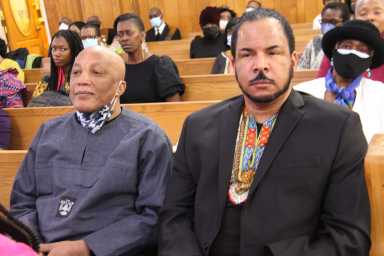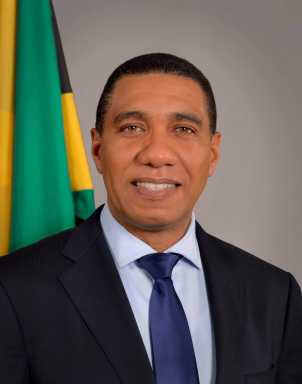Listeners:
Top listeners:
-
play_arrow
RadioJLR Just Press Play

As renowned British journalist Laura Trevelyan on Thursday, May 1 discussed the “reckoning” of the cruel history and current legacy of the transatlantic slave trade, Grenadian Adjunct Prof. Martin P. Felix, coordinator of the Caribbean Studies Minor, in the Department of Social Sciences, at the Fashion Institute of Technology (FIT), State University of New York (SUNY), says that the Grenadian people should be the ultimate determinants of any slavery reparatory process.
“Following her apology, Laura Trevelyan should first begin with a series of town hall meetings on the issue nationwide,” Prof. Felix, a Brooklyn-based community and social activist, told Caribbean Life after Trevelyan discussed the “reckoning” with Arley Gill, chair of the Grenada National Reparations Committee, among others, at the Brooklyn Public Library (BPL), downtown Brooklyn.
“At the end of this process, some form of agreement on a Grenadian procedure for reparatory justice would occur,” Felix added.
BPL noted that, on Feb. 27, 2023, an “historic apology to the people of Grenada was signed by 106 descendants of the British aristocrat Sir John Trevelyan for their family’s role in slavery.”
BPL said the initiative was led by Trevelyan, a former BBC anchor, who, in 2016, first learned that her ancestors were absentee owners of 1,000 enslaved Africans, who worked on their sugar plantations in the 18th and 19th centuries.
Together with the Grenadian government, represented by Gill, BPL said Trevelyan and her family crafted “a formal, public apology – an act of reparatory justice – which is the first and primary step in the 10-point reparations plan put forth by CARICOM (the Caribbean Community).”
BPL said Trevelyan is a co-founder of Heirs of Slavery, a group of British people whose ancestors profited from the enslavement of Africans in the Caribbean.
“Heirs of Slavery is encouraging other families with similar histories to acknowledge this fraught past, and calling on Britain’s government to engage in reparatory justice talks with Caribbean governments,” BPL.
It said Trevelyan is participating in the United Nations Educational, Scientific and Cultural Organization’s (UNESCO) first dialogue for reparatory justice.
Prof. Felix said one possibility of the Grenada reparations option is that the family, in conjunction with the Bank of England, and others who were enriched from Grenadian slavery, will establish a “modern, well-equipped Grenada Heritage District.
“Like the Barbados plan, this site will be dedicated to the history of enslavement in Grenada and its enduring traumas,” he said.
“Attendant to this recommendation could be the legal stipulation that Britons with financial interests in slavery, the Bank of England, etc., would fund and maintain this institution for the next 200 years or commensurate with their involvement in Grenadian enslavement,” added Felix, stating that there are also other possibilities of reparative justice in this context, “money being only one aspect of a multi-pronged agenda.”
Prof. Felix said another option could be for the United Kingdom’s benefactors of Grenadian enslavement to build a “well-equipped, state-of-the-art, modern hospital in the country.
“This could be built in the Bacolet or Hope Vale area, the site of the erstwhile plantations owned by the Bank of England, and the location of much of our ancestors’ physical and psychological pain,” he said.
“Such measures are two possible ideas that can go a long way in beginning to repair the harm done to our people and as a means of adequate, effective, overdue restorative justice,” he added. “The Trevelyans and other families should also see this as mutually beneficial.
“They can gain respect as the first family to have taken this brave step of making concrete amends for Caribbean plantation atrocities,” Felix continued. “And this won’t exact much of their current wealth, especially with the possibilities of tax write-offs.”
But he warned that anything short of legal, substantive, institutional commitment from the Trevelyans in these conversations would be “tantamount to accepting trinkets of beads for the hundreds of thousands of descendants of Africans who have suffered on Grenadian plantations.
“The acceptance of less than one pound per Grenadian risks reducing our people to the caricatures the colonists depicted in Eurocentric accounts of the historic first encounter on our islands — begging at the doors of the very people who relegated us to mendicants in the first place,” Prof. Felix posited.
BPL said that, before leaving the BBC, Trevelyan went on a “historic trip to Grenada in February 2023, where the Trevelyans publicly apologized to the Grenadian people for the role of their ancestors in enslaving Africans on the island.
“Laura delivered the inaugural Sir Tom Hopkinson lecture in March 2024, where she called on the British government and its leading research institutions to make a financial commitment to preserve endangered archives in the Caribbean,” BPL said.
It said Trevelyan, who lives in Brooklyn, with her husband James Goldston, former president of ABC News and now president of Candle True Stories, a global documentary company, is a member of the Council on Foreign Relations and the Chancellor of Cardiff University in the UK.
She is the author of two books: A Very British Family: The Trevelyans and their World and The Winchester: An American Dynasty.
Written by: Adm
Similar posts
© 2025. All Rights Reserved by Radio-JLR


